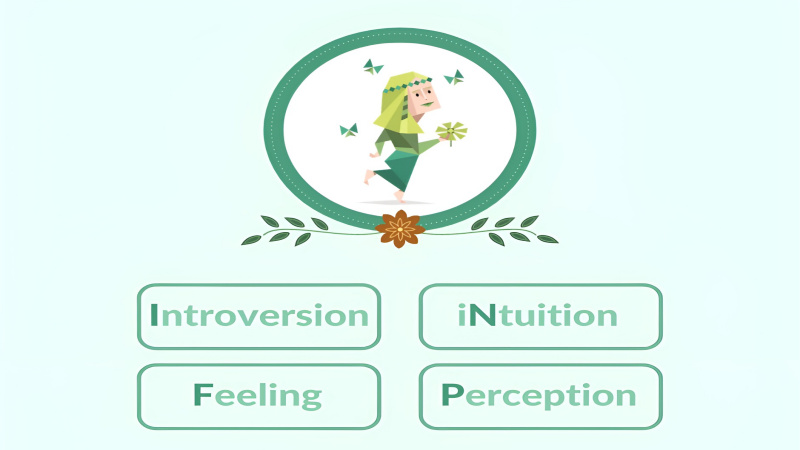Identifying our personality traits plays a vital role in helping us chart our development path for the future. What personality group do you belong to? Are you an INFP Idealist? Let’s find out more about this!
1 What is INFP?
INFP stands for “Introverted, Intuitive, Feeling, Perceiving,” describing 1 of the 16 Myers-Briggs Type Indicator (MBTI) personality types – a psychological tool used to classify personality types based on several fundamental personal factors.
Specifically, INFP describes individuals with the following traits:
- Introverted: They typically focus on inner thoughts and emotions, prefer working alone and independent thinking.
- Intuitive: They lean towards imagination, care about the hidden meanings behind events, and constantly seek new ideas.
- Feeling: They care about their own emotions and others, often make decisions based on personal values and feelings.
- Perceiving: They tend to be open-minded and friendly.
 INFP is an acronym for Introverted, Intuitive, Feeling, Perceiving
INFP is an acronym for Introverted, Intuitive, Feeling, Perceiving
2 Advantages of the INFP personality group
The INFP personality group has many advantages, namely:
- Creativity and deep thinking: INFP individuals often have creative thinking abilities and especially the ability to search for hidden meanings behind aspects of life. They often generate new ideas and unique approaches to problem-solving in life.
- Perceptive and empathetic: The INFP personality type is often highly sensitive to the emotions of others and has a strong ability to empathize. This helps them create a supportive and understanding environment for those around them.
- Tolerance: INFPs often do not prioritize personal interests. They always care more about others than themselves. In addition, they are often willing to forgive the mistakes of others.
- Open-mindedness: They often have flexible thinking and consider issues from multiple perspectives, not judging based on prejudice. They also do not criticize or judge others based on appearances.
 Advantages of the INFP personality group
Advantages of the INFP personality group
3 Disadvantages of INFP
In addition to the mentioned advantages, the INFP group also has some disadvantages:
- Difficulty facing reality: INFPs are often dreamy and may have difficulty facing harsh reality. They may take time and energy to adapt to practical situations in life.
- Too sensitive: Their sensitivity can make INFPs easily influenced by the emotions of others or the situations around them. This can make them feel stressed or tired.
- Difficulty making decisions: Due to their focus on emotions, INFPs may have difficulty making major decisions or urgent decisions. They may spend a lot of time thinking and considering different options.
- Difficulty expressing opinions: INFPs often respect the opinions of others and may have difficulty expressing their own opinions. This can make them feel uncomfortable in argumentative or conflicting situations.
- Feeling lonely or not understanding themselves: Due to their deep emotions and deep thinking, INFPs may feel lonely or have difficulty understanding themselves, especially when they do not find sharing from others.
 Disadvantages of INFP
Disadvantages of INFP
4 Which professions suit INFP?
The INFP personality can adapt and thrive in various professions. Here are some professions that are suitable for INFP individuals:
- Arts and Creativity: The INFP personality type often has creative vision, the ability to understand deep emotions. Therefore, they can succeed in careers such as artists, musicians, writers, designers, photographers, etc.
- Psychology and Counseling: The strong empathy and good listening skills of INFPs can support them in becoming psychological experts or counselors. They can work in personal counseling, career counseling, family counseling, etc.
- Healthcare and Caregiving: With their emotions and concern for others, INFPs can become healthcare professionals such as nurses, caregivers, nutrition consultants or work in the field of mental health and psychology care.
- Education: Individuals with the INFP personality type often enjoy imparting knowledge and creating a friendly learning environment. They can become teachers, trainers, or take positions related to training and teaching.
- Media and Publishing: With their creative minds and rich imagination, INFPs can work in the field of publishing, editing, writing, journalism, broadcasting, etc.
 Professions suitable for the INFP personality group
Professions suitable for the INFP personality group
5 Famous people with the INFP personality group
Here are some famous people with the INFP personality group:
- William Shakespeare: The famous English playwright, considered one of the greatest authors in the history of literature.
- J.R.R. Tolkien: An English writer, author of “The Lord of the Rings” and “The Hobbit” fantasy series.
- George Orwell: An English author, famous for works like “Animal Farm” and “1984,” showing deep insights into society and politics.
- Vincent van Gogh: A Dutch painter, one of the most famous artists in art history, with impressive paintings that demonstrate creative thinking and deep emotions.
- J.K. Rowling: A British author, known for creating the “Harry Potter” series of novels.
- John Lennon: A British singer, musician, member of The Beatles band, famous for expressing deep thinking and meaningful messages through music.
- Björk: An Irish singer, musician, known for unique music and creative artistic vision.
- Tim Burton: An American director, producer, creator of films with unique and imaginative styles.
 Famous people with the INFP personality group
Famous people with the INFP personality group
Above are our insights into the personality traits of INFP – The Idealist. We hope that with this article, you have gained some useful information. Thanks for following!





































